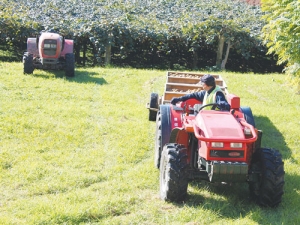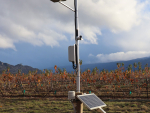A cold winter and wet, windy spring has seen a resurgence of Psa in kiwifruit vines in all affected areas.
And the bacterial disease has been found in the Whangarei region for the first time.
However, Kiwifruit Vine Health (KVH) chief executive Barry O'Neil is confident the management techniques developed over the past five years will keep it well under control. In fact, he believes management practices developed to combat Psa have helped boost kiwifruit production.
KVH met with 50 Whangarei growers and industry people last week.
"Obviously there is disappointment in the region but we focused both as a region and as individual growers on what needs to happen now Psa has been identified," says O'Neil.
"The pro-activeness of individual growers in managing the risk and the collective action of the regional growing community are important now."
Until now Whangarei's 144ha of kiwifruit production in 49 orchards has been free of the disease, despite confirmed Psa being found further north in Kerikeri and south in Kumeu, Auckland.
O'Neil says at last week's meeting they discussed how regions like Kumeu had stopped the spread after Psa was identified two years ago in one orchard. That orchard of Hort16a – an older variety of Gold which is very Psa sensitive -- was cut out straight away. "So far there haven't been any more orchards in the Kumeu region where Hort16a has been identified."
O'Neil says there is only 25ha of Hort16a left in the Whangarei region. Most Gold growers are already transferring to the more resistant G3. The orchard in Mangatapere where Psa has been found on male and female vines was already grafting G3 onto the rootstock and the Hort16a is being cut out.
Growers were disappointed but generally calm about the find.
But overall more Psa is being seen this season. "Spring is the time we see Psa show itself as the vines come out of dormancy," says O'Neil. "But this year we are seeing more Psa than last year because of the winter conditions were colder and now spring is wetter and windier.
"It comes through on the new Gold variety but it is relatively tolerant. Providing growers are proactive in managing it, it is not creating significant problems in most cases.
"Some of the more challenged orchards, very cold low areas or wet areas, have more of a problem."
But O'Neil says it is not anticipated it will have any impact on overall production this season.
"When you look at the industry recovery and the record production levels we have had this last season, even in a Psa environment, we as an industry have increased our productivity," he says.
Growers are helping this by paying more attention to the details – getting shelter and drainage right, artificially pollinating, protecting vines better and improving orchard hygiene between vines.
"Collectively, even with Psa, that has resulted in growers increasing their production rather than decreasing. So it is too early to say what the impact will be for next harvest but at this stage we are not anticipating any significant change."
Green is affected in different ways than the Gold. In Gold there is more cane dieback and collapse. In the Green there is leaf spotting and flower infection, so the flowers don't pollinate and they drop off. "That is a challenge for Green growers who need to be vigilant in managing that."
Various research efforts are still underway to combat Psa. "I don't think for a windborne bacterial disease there is one cure that will be found but there are a number of strategies underway. One is breeding more tolerant varieties and so Zespri with Plant and Food is [working hard] to do that.
"Secondly, improve tools to manage the impacts on vines – whether that's cheaper products, small biological products and endophytes; we've got a large research programme underway investing $2m a year, totally $12m to date, and that will continue until we are confident we understand Psa, and the impacts of Psa have been minimised in the industry."



















